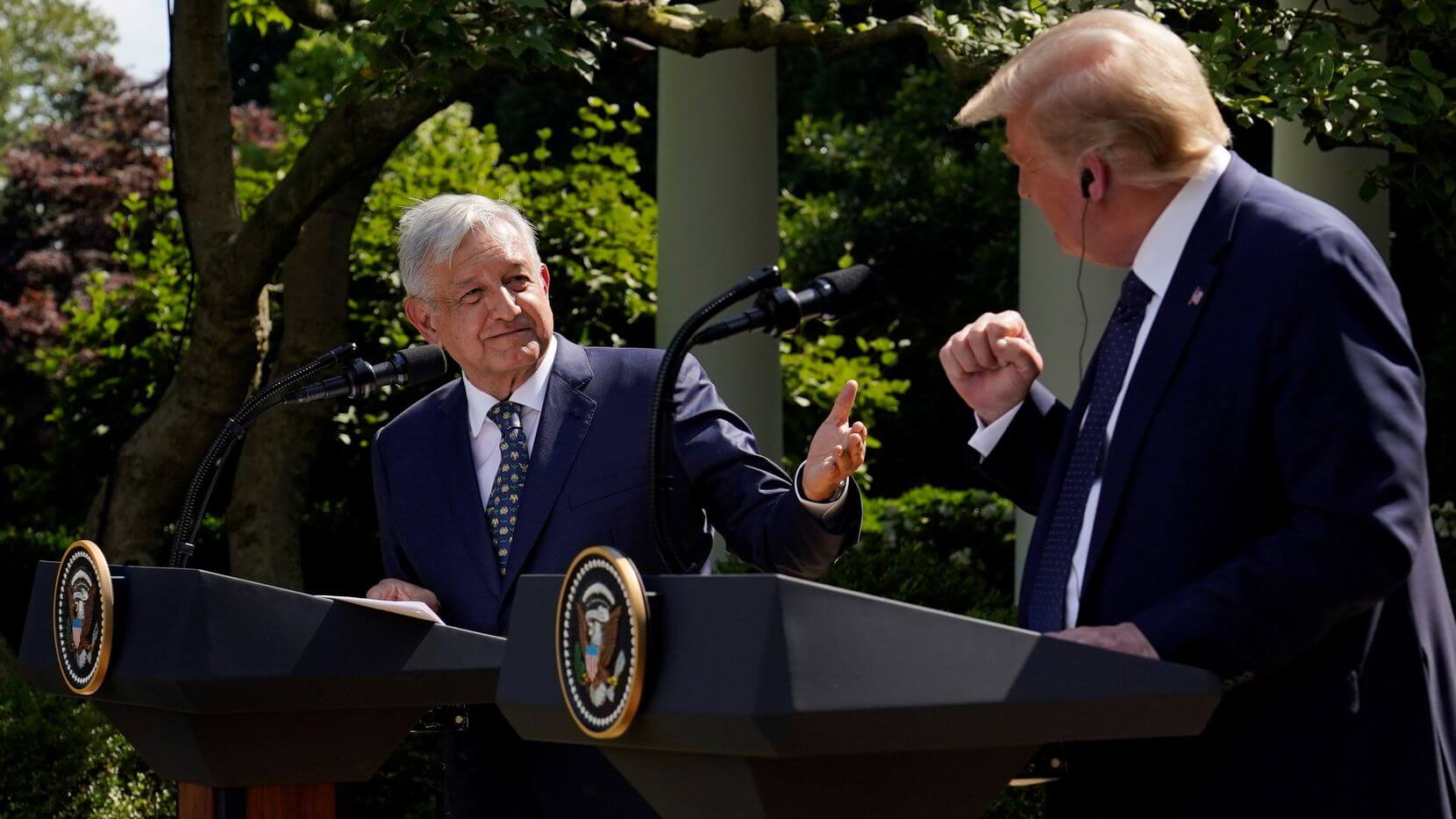Mexican President Andrés Manuel López Obrador (AMLO) met with American counterpart Donald Trump at the White House on Wednesday, marking the first overseas trip since the start of his presidency December 2018. The two leaders discussed US-Mexico relations and the renewed US-Mexico-Canada trade agreement (USMCA).
Despite the ideological differences between the left-leaning López Obrador and the right-wing Trump, AMLO sought to emphasize upon the “friendship between our governments”. In fact, Trump’s national security adviser Robert O’Brien said Trump and AMLO “really hit it off”, which culminated in them signing a declaration that highlights US-Mexico relations and the USMCA. They also agreed to further coordination and cooperation in the two countries’ coronavirus responses, particularly given that the countries share a border.
The US has also recently sought to reduce its dependence on China by moving supply chains away from the East Asian giant. Indeed, Mexico became the US’ largest goods trading partner in 2019.
Nevertheless, the Mexican president’s decision to meet with Trump has drawn anger and confusion back home, especially in light of Trump’s previous comments on Mexico and Mexicans. Critics argue that by standing next to Trump, the Mexican President has in essence validated the xenophobic and racist views of the American leader.
During the campaign trail that preceded his ascent to the presidency in 2016, Trump referred to Mexican immigrants as rapists, drug traffickers, and criminals, and curiously claimed that Mexico would pay for the border wall. Once in office, he expanded the operations of detention facilities across the border, which have been criticized for essentially being ‘concentration camps’, where children are separated from their families, and basic medical and nutritional needs are not met. He has also empowered the Immigration and Customs Enforcement (ICE) to carry out large-scale deportations. Moreover, Trump even threatened to impose heavy tariffs on Mexico last year.
In April, however, it appeared that US-Mexico relations were beginning to thaw, when Trump called AMLO a “very good friend”, and praised his “tremendous intelligence”. Similarly, López Obrador has hailed his “friendship” with Trump, and has talked of visiting him once this pandemic draws to a close, a promise which he has now made true on.
Moreover, this renewed friendship has not only yielded platitudes, but also tangible benefits. When Trump was brokering a deal between oil-producing nations to reduce production, Trump offered to further reduce US production on behalf of Mexico. This would allow Mexico, which could not afford to significantly reduce production, to make fewer cuts than required by the deal right now, provided that it pays the US back in the future.
In addition, the Department of Homeland Security has engaged in cordial relations with Mexico over restricting non-essential travel across the southern border during this pandemic.
In response, López Obrador discussed meeting Trump in June or July to “express [Mexico’s] appreciation”, adding that Trump “has been respectful of the people and government of Mexico”. He further stated, “There isn’t the belittling of Mexicans like there had been before, there isn’t with the same intensity.”
Of course, much of the thawing in this relationship cannot be attributed to the ongoing coronavirus crisis alone. In fact, it has been an ongoing process for over a year now. López Obrador has long talked about stepping away from his predecessors’ policies of privatizing state-owned businesses and unions. However, last year, Mexico signed a new regional free-trade agreement with the US and Canada. This indicated that López Obrador had understood that, in order to protect Mexico’s economy from the highly volatile Trump, he may need to not only massage Trump’s ego through his words, but his actions as well.
Similarly, when an overwhelming amount of asylum seekers arrived at the US-Mexico border last year, Mexico avoided the crippling tariffs Trump was threatening by deploying its National Guard to stop several Central American immigrants headed north to the US. Mexico also acquiesced to Trump’s policy of making asylum seekers wait in Mexico while their cases were being processed in the US. Even during the ongoing pandemic, the US is using its health emergency to send Mexicans and Central Americans back to Mexico.
Others contend that the visit may be a way to distract from Mexico’s coronavirus response, with a rising number of infections and deaths. Like his northern neighbor, AMLO has shown an unwillingness to wear a mask in public and has favored reopening the economy over extensive disease control and prevention methods. He has even dismissed requests for him to get tested for the virus, even after multiple officials in his vicinity, such as his treasury secretary, tested positive.
Given the fragility of Mexico’s economy, López Obrador has had to swallow his pride and forgo some of his core policies to appease Trump. While this has reduced Mexico’s autonomy in a sense, it has also bought some goodwill and softened the position of Trump, who has previously engaged in a far greater level of aggression against Mexico.
Canadian Prime Minister Justin Trudeau was also invited to the meeting, but backed out amid concerns about US tariffs on Canadian aluminum.
US-Mexico Coverage:

